二年级英语第12讲知识总结
牛津深圳版英语二年级上册第12单元预习及知识点复习汇总

就要在句子前面加don't。如 Climb the tree. Don't climb the tree.
2.I'm sorry.对不起。是礼貌用语,也可以直接用sorry来代替,只是sorry一般用于口 语。 3.字母X和S的发音很容易混淆,认真听老师或录音的示范,注意不要弄错了。
谢谢阅读
三、熟读 字母
能认读大小写字母X x,Yy和Z z。
四、重点句型
1.Don't climb the tree.不要爬树。 2.Don't pick the flowers.不要摘花。 3.I'm sorry.对不起。 4.Look at this flower. It's beautiful.看这朵花。它真漂亮。 5.Help! Help! 救命啊!救命啊! 6.Don't run/cry.不要跑/哭。
二、 单词拼读及例句
·park[pɑːk] / n.公园 I''m going to the park.(我要去公园。) ·nice[naɪs] / adj.令人愉快的;友好的 Nice to meet you.(很高兴见到你。) ·beautiful[ˈbjuːtɪfl] / adj.美丽的 She is such a beautiful lady.(她是一位如此美丽的女士。) ·cry[kraɪ] / v.哭;哭泣 I started to cry because I cut my finger.(我因为割破手指哭了起来。) ·yak[jæ k] / n.牦牛 I would like to have the special yak''s steak dinner.(我想要牦牛排特餐。) ·zebra[ˈzebrə] / n.斑马 A zebra has stripes.(斑马身上有条纹。)
第12讲 用所给单词适当形式填空(课件)- 2024年中考英语一轮复习(全国通用)

夯基·必备基础知识 用所给单词适当形式填空
★分析空所在句子,就是句子成分以及词法修饰
1.句型:
①be动词(am/is/are was/were)
①“变化”类get/turn/become/go/grow
(1)主+系+表
系 ②半系动词 ②稿“定保P持PT”类 keep/stay/remain
③“表象”类see稿新m定,/aP上pPp千T,e款a海r模量板素选材择持总续有更一 ④感官动词loo款k适/s合ou你nd/smell/taste/feel
(期待)
真题感悟
真题感悟
1.(2022·辽宁大连·统考中考真题)Astronauts need to take part in difficult_____
before they go to space. (train)
【答案】training
【详解】句意:宇航员在进入太空之前需要参加艰苦的训练。difficult是形容词,修饰
款适合你
真题感悟
8.(2022·湖南常德·统考中考真题)We also look for ways to review
what we ______ (learn) since three years ago.
【答案】have learnt
【详解】句意:我们也想办法复习三年前学过的东西。根据“since
此处是指我们自己,用反身代词ourselves。故填ourselves。
真题感悟
3.(2022·辽宁大连·统考中考真题)For Tony, nothing is more
________than playing tennis. (enjoy) 【答案】enjoyable 【详解】句意:对托尼来说,没有什么比打网球更令人愉快
新概念英语第二册《Lesson12Goodbye and good luck》随堂笔记及课文解析
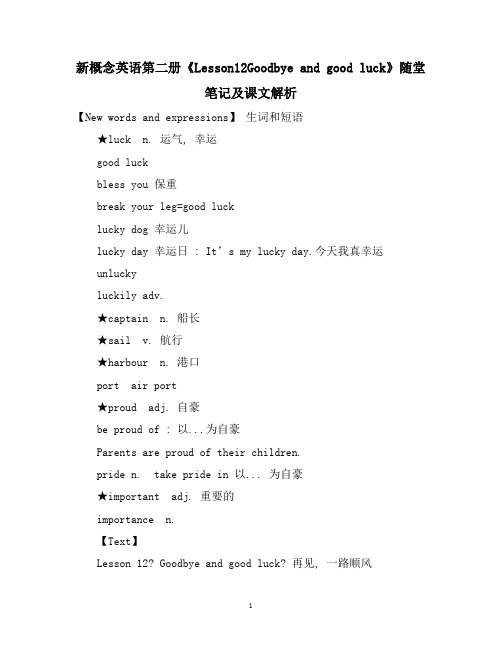
新概念英语第二册《Lesson12Goodbye and good luck》随堂笔记及课文解析【New words and expressions】生词和短语★luck n. 运气, 幸运good luckbless you 保重break your leg=good lucklucky dog 幸运儿lucky day 幸运日: It’s my lucky day.今天我真幸运unluckyluckily adv.★captain n. 船长★sail v. 航行★harbour n. 港口port air port★proud adj. 自豪be proud of : 以...为自豪Parents are proud of their children.pride n. take pride in 以... 为自豪★important adj. 重要的importance n.【Text】Lesson 12? Goodbye and good luck? 再见, 一路顺风First listen and then answer the question.听录音, 然后回答以下问题.Where is Captain Alison going and how?Our neighbour, Captain Charles Alison, will sail from Portsmouth tomorrow. We'll meet him at the harbour early in the morning. He will be in his small boat, Topsail. Topsail is a famous little boat. It has sailed across the Atlantic many times. Captain Alison will set out at eight o'clock, so we'll have plenty of time. We'll see his boat and then we'll say goodbye to him. He will be away for two months. We are very proud of him. He will take part in an important race across the Atlantic.参考译文我们的邻居查尔斯.艾利森船长明天就要从朴次茅斯启航了. 明天一大早我们将在码头为他送行. 他将乘坐他的“涛波赛” 号小艇. “涛波赛” 号是艘有名的小艇, 它已经多次横渡大西洋. 艾利森船长将于8点钟启航, 因此我们有充裕的时间. 我们将参观他的船, 然后和他告别. 他要离开两个月, 我们真为他感到自豪, 他将参加一次重大的横渡大西洋的比赛.【课文讲解】Portsmouth 朴次茅斯(英国港市)将来时态early in the morning : 一大早late in the afternoon 傍晚meet somebody+地点去某地接某人I'll meet you at the station.see somebody off 送行, 目送in his small boat, Topsail : Topsail is a famous little boat.1、英文写作中尽量避免用同一个词2、little……往往倾注了一定的感情small……没有感情famous : 好的评价sailed across : 横渡the Atlantic : 大西洋over……过桥once twice three times......表示次数的时候, for 一定不能加I do something twice.set out : 出发set off begin somethingplenty: enough 而a lot of : 指客观上的多plenty of : I have plenty of money.相对多的概念see--visit Can I see it?say goodbye to somebody; say hello to; say sorry toI said hello to him this morning.You must say sorry to somebody.be away He has been there. leave……短暂性动词不能和段时间连用He will leave. 不用段时间be+形容词(介词短语)――系表结构表状态来代替arrive …… be here/thereleave …… be awaydie …… be deadjoin(也是瞬间动词) …… be a soldier/in the army不是说瞬间动词不能用完成时态, 而是指不能与段时间连用, 一旦要用段时间就要将其变为“系表结构” 即“be + 形容词或介词短语构成” .He has been away for two hours.He left two hours ago.点时间take part in; enter forI have entered for the meeting,but now I don't want to take part in the meeting.横渡大西洋的比赛across the Atlantic 介词短语做定语放在被修饰词的后面on the desk The book is on the desk.at the door. the person at the door.总结和水面有关, 横渡……acrossmeet somebody+地点see somebody offbe away【Special Difficulties】难点一般将来时be+副词be in ; Is Tom in? Tom isn’t in 在家be out 出去 be away : 离开 be on : 上映 The film is on.be back 会来be up to something:胜任某件事情, 能够做某件事be over 结束 Game is over.set set out set off set up【Multiple choice questions】多项选择题2? Topsail ______ .a.will win the race across the Atlanticb.has won the race across the Atlanticc.will be in the race across the Atlanticd.was in the race across the Atlantic2.Topsail...Cwill...将要完成has... 已经完成be in the race : take part in the race 参加比赛at the race 在比赛场地观看比赛拜访某地call at在某个小地点at the airport3? Our neighbour, ______ name is Charles Alison, will sail tomorrow.a.whoseb.whose hisc.hisd.of whom3....Abe in the race : take part in the race。
二年级英语下册知识点归纳
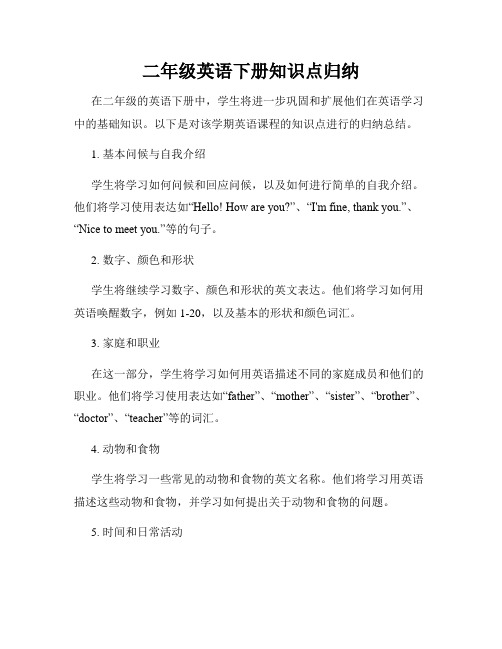
二年级英语下册知识点归纳在二年级的英语下册中,学生将进一步巩固和扩展他们在英语学习中的基础知识。
以下是对该学期英语课程的知识点进行的归纳总结。
1. 基本问候与自我介绍学生将学习如何问候和回应问候,以及如何进行简单的自我介绍。
他们将学习使用表达如“Hello! How are you?”、“I'm fine, thank you.”、“Nice to meet you.”等的句子。
2. 数字、颜色和形状学生将继续学习数字、颜色和形状的英文表达。
他们将学习如何用英语唤醒数字,例如1-20,以及基本的形状和颜色词汇。
3. 家庭和职业在这一部分,学生将学习如何用英语描述不同的家庭成员和他们的职业。
他们将学习使用表达如“father”、“mother”、“sister”、“brother”、“doctor”、“teacher”等的词汇。
4. 动物和食物学生将学习一些常见的动物和食物的英文名称。
他们将学习用英语描述这些动物和食物,并学习如何提出关于动物和食物的问题。
5. 时间和日常活动在这个模块,学生将学习如何询问时间并描述他们的日常活动。
他们将学会用英语表达一天中的不同时间,并学习使用诸如“get up”、“go to school”、“have lunch”、“go to bed”等短语来描述他们的日常活动。
6. 季节和天气学生将学习诸如春天、夏天、秋天和冬天等季节的英文表达。
他们还将学习描述不同天气条件的词汇,例如“sunny”、“cloudy”、“rainy”等。
7. 方位和交通工具学生将学习如何用英语描述方位和使用不同的交通工具。
他们将学习使用词汇和表达如“go straight”、“turn left/right”、“on foot”、“by bike”等。
8. 常用动词学生将了解一些常用的动词,例如“eat”、“drink”、“play”、“read”和“write”等。
他们将通过不同的例子来学习如何使用这些动词。
部编人教版英语二年级下册全册知识点归纳【】
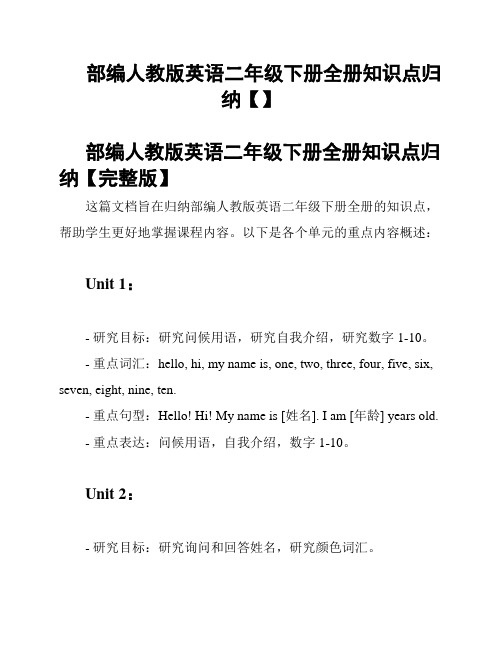
部编人教版英语二年级下册全册知识点归纳【】部编人教版英语二年级下册全册知识点归纳【完整版】这篇文档旨在归纳部编人教版英语二年级下册全册的知识点,帮助学生更好地掌握课程内容。
以下是各个单元的重点内容概述:Unit 1:- 研究目标:研究问候用语,研究自我介绍,研究数字1-10。
- 重点词汇:hello, hi, my name is, one, two, three, four, five, six, seven, eight, nine, ten.- 重点句型:Hello! Hi! My name is [姓名]. I am [年龄] years old.- 重点表达:问候用语,自我介绍,数字1-10。
Unit 2:- 研究目标:研究询问和回答姓名,研究颜色词汇。
- 重点词汇:What's your name? My name is..., color words (red, blue, yellow, green, orange, purple, black, white).- 重点句型:What's your name? My name is... What color is it? It's...- 重点表达:询问姓名,回答姓名,颜色词汇。
Unit 3:- 研究目标:研究询问和回答年龄,研究数字11-20。
- 重点词汇:How old are you? I am [年龄] years old, numbers 11-20.- 重点句型:How old are you? I am... years old. How many candles? Eleven, twelve, thirteen, fourteen, fifteen, sixteen, seventeen, eighteen, nineteen, twenty.- 重点表达:询问年龄,回答年龄,数字11-20。
二年级英语总结归纳知识点

二年级英语总结归纳知识点在二年级学习英语的过程中,我积累了许多知识点。
下面我将对这些知识进行总结归纳,以便加深理解和记忆。
本文将分为单词、语法和阅读三个部分进行归纳。
一、单词部分:1. 基础单词:在二年级英语学习中,我们学习了许多基础单词,如动物的名称(dog、cat)、水果的名称(apple、banana)、颜色的名称(red、blue)等。
这些单词是我们日常生活中经常使用的常见词汇。
2. 数字:我们学习了基本的数字,从1到100。
这些数字在进行计数和交流中起到了重要的作用。
3. 季节和月份:我们知道了四个季节的名称,分别是spring、summer、autumn和winter。
此外,我们还学习了月份的名称,如January、February、March等。
4. 时间:我们学习了如何询问时间,并且掌握了一些表示时间的词汇,如morning、afternoon和night。
5. 家庭成员:我们学会了称呼家庭成员,如father、mother、brother 和sister等。
二、语法部分:1. 介词:我们学习了常见的介词,如in、on和under等。
这些介词在描述位置和方向时起到了关键作用。
2. 时态:对于一般现在时,我们学会了构建肯定句和否定句,并掌握了一些常见动词的第三人称单数变化规则。
3. 形容词比较级:我们通过学习形容词比较级,掌握了用于比较两个物体或人的语法结构。
三、阅读部分:在阅读方面,我们学习了简单的短文,通过阅读理解文章中的关键信息,来回答问题。
我们还学会了利用图片和关键词归纳文章的主题和主旨。
通过以上总结归纳,我对二年级英语学习的知识点有了更深入的理解和掌握。
在今后的学习中,我将进一步巩固这些知识,并不断提高自己的英语水平。
小学英语语法知识点第12讲 一般现在时
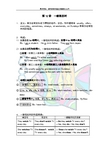
更多资料,请关注纳米盒会员微信公众号第12讲一般现在时1. 定义:表示经常发生或习惯性的动作、状态。
句中通常有usually,often,every day,sometimes,always,at weekends,on Sundays等表示经常性时间的短语。
2. 构成:1)当谓语是be动词时,一般现在时的构成:主语+be动词+其他如:I am a student. He is Jim’s father. They are from Japan.2)当谓语是行为动词时,一般现在时的构成:①主语(非第三人称单数)+动词原形+其他如:I often watch TV at the weekends.Mr Green and Mrs Green like collecting stamps.②主语(第三人称单数)+动词的第三人称单数形式+其他如:Jim usually visits his grandparents on Sundays.She sometimes goes to the park with her mother.3. 动词三单形式的变化规则:①一般情况下,直接加s 如:read-reads,swim-swims②以s,x,sh,ch,o结尾,加es 如:wash-washes,watch-watches,do-does③以辅音字母+y结尾,变y为i,再加es 如:study-studies,fly-flies④不规则变化如:have-has4. 一般现在时的句型转换:肯定句否定句一般疑问句及回答They watch TV every day.They don’t watch TVevery day.—Do they watch TV every day?—Yes, they do. / No, they don’t.She watches TV every day.She doesn’t watchTV every day.— Does she watch TV every day?—Yes, she does. / No, she doesn’t.。
新编英语语法教程_第12讲_练习参考答案

新编英语语法教程第12讲练习参考答案Ex. 12A1. have been telephoning, Haven’t you nearly finished; haven’t got, have been trying, has been2. have been playing, haven’t played3. have been writing / have written4. have … been learning / have … learned5. has been sleeping /has slept6. has been coughing / has coughed7. have known, have been reading, haven’t finished8. have been, have … come9. has been learning, has mastered10. has been raining, has stopped11. have travelled12. Have … read13. have been reading14. have read15. has let16. has been crying17. has injured18. has been assassinated19. have been working20. has been losingEx. 12B1. YES2.NO3.YES4.YES5.YES6.YES, NO7.YES, NO8.NO, NO, NO9.YES, YES, YES 10.YES, NOEx. 12CI. (1)struck (2)reached (3)lit (4)sat (5)had left (6)had had (7)put(8)undressed (9)got (10)fell (11)had put (12)had forgotten (13)dropped (14)burned (15)found (16)had burned (17)had … madeII. (1)opened (2)saw (3)had … been listening (4)wondered (5)had heard (6)asked (7)had been doing / was doing (8)said (9)had dropped (10)had been looking (11)didn’t see (12)found (13)had … dropped (14)opened (15)had been taking (16)were (17)turned (18)asked (19)pulled (20)ran (21)recovered (22)had disappeared (23)moved (24)found (25)had been standing (26)had been telling Ex. 12D1. I met George after he had heard …2. I met George before he had heard …3. We reached the football ground before the game had started.4. We reached the football ground after the game had started.5. As soon as we arrived at the station, we bought …6. For several years after Dick (had) left school, he worked …7. After she’d cleaned … she had …8. When we arrived, they’d laid …9. He’d done all his work by the time he went …10. The secretary had typed … by the time I came …11. I’d only been there … when John walked in.12. He’d answered … before he got a job.13. They left before I’d explained …14. We managed … before the concert had started.15. She didn’t notice it until he’d pointed it out.16. I’d no sooner taken off … than it began …17. I’d no sooner put … than I realized …18. He didn’t understand until I’d explained.19. He came in before I’d done …20. We got to the hall after the concert had started. We didn’t get to the hall until after the concert had started. The concert (had) started before we got to the hall.Ex. 12E1. went2. was / were3.hadn’t said4.hadn’t drunk, hadn’t drunk5.had expected, had intended6.hadn’t lost7.hadn’t told8.knew /had known9.had come 10.had meant 11.had wanted 12.wasn’t 13.hadn’t been 14.had never seen 15.had given 16.had seen 17.had asked 18.hadn’t broken 19.knew 20.had never been inventedEx. 12F1.haven’t got to2.Have you got3.hadn’t got to4.have got to5.have got to6.hadn’t got to7.had got8.have got9.have got to 10.hadn’t got to 11./ 12.has got 13./ 14.haven’t got to … have we 15. have go t 16./ 17./ 18.has got to 19./ 20./Ex. 12G1. have explained2. have had3. drank, drove, got, gave, has been breathalysed4. was, had visited5. had tried6. will be, have had to7. are going to stay, will be, haven’t been8. will be, have taught; teach, take, will be9. are … getting on; have done, learnt10. Have … been; went, went, was, had been, liked, goEx. 12HI. 1. Do you … know 2. should /would like 3. have just heard 4.would exactly suit5.doesn’t apply6.won’t get7.saw8.had just left9.said 10.was going 11.promised 12.(had) found 13.have heard 14.don’t even know 15.went 16.know 17.should/would be 18.would phone 19.have tried 20.doesn’t / didn’t seemII. 1.wrote 2.asking 3.replied 4.enclosing 5.filled up 6.returned 7.have heard 8.am beginning 9.has gone 10.Would/Could you please check 11.have received 12.have received /did receive/ received 13.haven’t decided 14.should/would be 15.would tell 16.has already been 17.should/would like 18.don’t get 19.will have to 20.do 21.will have / have新编英语语法教程第13讲练习参考答案Ex. 13A1. will just be coming out2. will be, will be wondering3. will come4. will be doing, will be working5. will get, will still be, will be going, will ask6. will be melting, will be7. won’t start, will give8. will tell9. will be reading, will be ringing10. will be cooking, will ring11. am going to shampoo12. is going to bake, will soon get13. will see14. am going to have15. am going to bottle16. Are you going to paint, am going to take17. am going to ring18. am going to start, Are you going to do, is going to help19. will start, will get, will bake20. am going to make, will burn21. is arriving, Is he spending, is he catching, is spending, is giving, is attending22. am going to dye, Are you going to do, are you going to have, am going to have23. is going to rain24. Are you doing, are coming, am going to show, Are you taking, am going to take25. am going to send, am seeing26. am moving, Are you going to have, am going to paint27. am going to buy, is going to be28. are you going to do, Are you going to sell, am going to learn, am having29. am getting, are starting, is coming30. is going, is having, is looking, is coming31. will have finished, will be starting32. will have planted33. will have done, will be relaxing34. will have done, will soon be leaving35. will be trying, will have sent36. will be living, will have spent37. will be giving, will have given38. will be coming, will have picked39. will be fishing, will have been polluted, will be dying40. will be repairing, will have repairedEx. 13B1. would have/were going to have2. were going to swim/were swimming/were to swim3. was to discover4. (1)is going to catch/is catching/is to catch (2)is going to attend/is attending/is to attend5. was going to show./ was about to show6. was going to be/was to be7. were not to use8. (1)would be/was going to be/was to be (2)were going to discuss/were to discuss9. (1)Are … going to watch (2)was going to watch(3)is arriving (4)am going to meet (5)was going to arrive10. (1)are … to be (2)were to be (3)were to have got(4)was to have taken place (5)are … to haveEx. 13C1. We’ll start off as soon as the rain stops.2. I’ll ring you up directly I hear the news.3. If you are leaving ear ly tomorrow morning, you’ll have to finish packing before bedtime.4. The committee are to gather next Thursday to settle the question.5. He is not to stay here any longer. He is to leave at once.6. She said that by the end of the week she would have been back to China.7. He told me yesterday that he was going to get married next month.8. He announced at the press conference that the prime minister of Japan was to visit China next Monday.9. If you go and see him at six, he will be taking morning exercises.10. What will you be doing at 7: 30 tomorrow evening?11. When you come back from Nanjing next week, the discussion will have finished.12. By next weekend, I’ll have been here for a whole year.13. Don’t get off the bus till it stops.14. They are going to spend their holidays in Dalian next summer.15. Look! The dark clouds are gathering. It is going to rain.16. If I’m at lunch when he comes, please tell him to wait a little while.17. We’ll stay here for a couple of days before we go on to Xi’an.18. We’re having our dress rehearsal tomorrow evening. Are you coming?19. How many students are going? Are they going by boat?20. The Foreign Ministers were to have met on May 14 to discuss the proposals for easing the crisis, but the war broke out.新编英语语法教程第14讲练习参考答案Ex. 14A1. This house was built2. English is spoken …3. He has never been beaten …4. Milk is used ….5. My piano is being repaired …6. My shoes had been cleaned.7. /8. … a new system was being started.9. This dress can’t be washed; it must be dry-cleaned.10. A different attitude will have to be adopted. 11. /12. The bag is to be left …13. He will be sent to school …14. Bicycles must not be left …15. These engines used to be started … 16. /17. The wall is going to be painted green.18. You will be asked … 19. /20. He was told never to come …21. He was proved wrong.22. Those books should have been taken back.23. It may have been left … 24. /25. This letter need not be typed.26. Mary seems to be liked very much by John.27. She happened to be met in the street by the boy. 28. / 29. / 30. /Ex. 14B1. Who was it written by?2. Has my parcel been posted?3. My attention was held by …4. Your record has never been equalled.5. Why wasn’t I informed of the change …?6. A lot of time is wasted …7. The books had to be taken back; we were not allowed to take …8. This could be done much more easily by (a) machine.9. Jack was invited, but Tom wasn’t (invited).10. Weren’t you told to be ….?11. You are sure to be asked that question.12. That he wasn’t present should be borne in mind/ It should be borne in mind that ….13. The principle known as Boyle’s Law was discovered by …14. … my car had been towed away. I asked why this had been done and was told that … it hadb een parked …15. He must have been terribly disappointed to be told he wasn’t wanted.Ex. 14C1. This topic has been talked about …2. It will then be dealt with …3. The children weren’t properly looked after.4. Has this matter been looked into?5. Are you being attended to?6. Smith’s warehouse was broken into …7. My application has been turned down. 8. This question will be brought up …9. The trains were held up by fog. 10. Your argument is not borne out by the facts.11. Their stories are made up. 12. The application has been filled in incorrectly.13. The scheme was thought out carefully. 14. The prices were put up.15. Your photographs will be blown up well. 16. The recorded programmes can be played back.17. These interruptions were put up with. 18. His retirement is being looked forward to very much.19. The responsibilities are being faced up to badly. 20. He was looked up to by everyone.21. This piece of legislation had been done away with reluctantly.22. They weren’t taken in by her story. 23. I was got through the written papers by special coaching.24. He will be seen off at the airport by all the ministers.25. If it rains, the match will have to be put off …Ex. 14D1. Your remarks have been taken careful note of / Careful note has been taken of your remarks.2. His aristocratic connections are made rather too much of / Rather too much is made of his artitocratic connections3. … the matter was never paid attention to / … attentio n was never paid to the matter.4. These prisoners were made an example of (by …) / An example was made of these prisoners (by …).5. … that she was being made fun of.6. Special emphasis must be laid on …7. The plane was lost track of … 8. …. no mention was made of ….9. The excellent situation … must be taken full advantage of / Full advantage must be taken of …10. This state of things must be put an end to ...Ex. 14E1. being sent /to be sent2.being educated /to be educated3.being asked/to be asked4.to be sent5.being examined6.to be promoted7.to be transferred8.being asked9.being consulted 10.to be admitted 11.to be asked 12.being interviewed13.to be paid 14.being invited 15.to be photographed 16.being punished17.to be sent 18.to be taught/ being taught 19.being taken /to be taken 20.being leftEx. 14F1. I hope to be promoted.2. I expected all my letters to be typed promptly.3. I would like to be measured for a suit.4. I don’t want to be bothere d.5. I expect him to be kept in the picture.6. I don’t mind being criticized by you.7. I want to be left alone. 8. She objects to being disturbed when she’s reading.9. He insists on being shown respect.10. She doesn’t like to be flattered. 11. I want him to be punished.12. Will they permit the book to b e taken out of the library?13. We must not allow the interests of the people to be violated.14. They decided for the power plant to be built later.15. I’m worrying about my children being led astray in the forest.新编英语语法教程第17讲练习参考答案Ex. 17A1. can type2. can answer3. could never understand4. could solve5. (What you say) might be6. Shall I open…?7. will come8. Would you have…?9. will put 10. will sit 11. would hit 12. should sit 13. You should read 14. We must read 15. You must not smoke 16. Can you do 17. Should we wait? 18. We need not attend 19. That will be 20. that must beEx. 17Ba) 1. needn’t (= don’t have to, don’t need to, haven’t got to)2. won’t have to3. di dn’t have to (= didn’t need to)4. needn’t5. didn’t have to6. didn’t have to7. needn’t8. needn’t9. won’t have to10. needn’tb)11. You had to…12. He wasn’t to…13. He wasn’t to…14. You had to…15. He said I wasn’t to…16. They had to..17. We had to…18. I wasn’t to…19. He said you weren’t to…20. We had to…Ex. 17C1. should2. should3. Would, should4. would5. should6. would7. should, would8. should9. should 10. would, would 11. should 12. would, would 13. should 14. would, would 15. should 16. should 17. Should 18. would, should 19. would 20. should, should / wouldEx. 17D1. He may be doing his homework.2. She may have forgotten to call me back.3. Could you lend me 5 pounds until tomorrow?4. I wonder if I could leave now.5. It might rain this evening.6. Old Tom might have left San Diego.7. If it should rain tomorrow, the football match would be put off.8. You should do as he says.9. If you should change your mind, please let me know.10. I’m surprised that he should have an accident.11. Shall I go with you?12. You shan’t answer her back again.13. You mustn’t violate the traffic regulations again.14. He must have got lost in the mountains.15. You needn’t go and see him.16. You needn’t have written to her.17. You should have helped her.18. If you would change this car, I should be very grateful.19. Would you mind shutting the door?20. She shouldn’t have bought that house.21. It’s od d that she should say that.22. Don’t call him. He’ll be taking a nap.23. Don’t write to him. He won’t be home now.24. Don’t bother him. He will have heard the news.25. A lion will attack people only when hungry.26. What will you do after graduation?27. Mary ought to be home by now.28. You oughtn’t to have bought a new car.29. He used to work in Shanghai, but now he is nowhere to be found.30. How dare you say that in the presence of the principal?Ex. 17E1. He may be working for Simons.2. He may have been working for Simons.3. He may be retiring next year.4. He won’t be working now.5. He’ll have heard it by now.6. They may have been wondering what to do.7. He can’t have lost it.8. They must be waiting.9. That might be true.10. She should be home by now.11. She may have left it at home.12. I may have been mistaken.13. You must have been disappointed.14. She won’t have heard the news yet.15. There must have been a mistake.16. H e won’t be there.17. He can’t be there.18. He couldn’t have made that mistake.19. Will this be the one you want?20. You will have been wondering all this time how it works.Ex. 17F1. may2. might have3. may have4. possibly5. possible6. perhaps7. might8. can9. may have had 10. could 11. might be新编英语语法教程第18讲练习参考答案Ex. 18A1. He is likely to let you down.2. Our team is certain to win.3. There appears to be no doubt about it.4. John happened to be the only witness.5. I chanced to be out of London at the time.6. John doesn’t seem to be coming after all.7. We’re not supposed to play football on Sundays.8. He is supposed to have arrivedat five.9. He’s sure to be there.10. They are certain to need help.11. I think it’s going to rain this evening.12. How am I to pay my debts?13. The new building is going to be six storeys high.14. You’re not to talk like that.15. He’s likely to see her.16. You’ve got to be jokin g.17. He tends to be stupid.18. I fail to see what you mean.19. We happened to be there.20. I chanced to meet him in the park.21. He appeared to enjoy the concert.22. They seemed not to notice it.23. The swimmer failed to reach the shore.24. We were to have been married in May.25. The purse was not to be found.26. He was never to see his wife or children again.27. It’s going to be a long time before we can reduce our prices.28. John is bound to be in the office.29. None of us can say what our future is to be.30. He did not fail to keep his word.Ex. 18BJ:Mary has…, but she dose not…D:/J:I do not…It is…She would…D:If she does not…she will…J:Yes, I am…D:I should…she would…Are they not…J:….she would…D:…there is…J:…there is not…You would…, would you not?D:I would not…But nobody has…J:You need not…You have got…D:…if I had…, I would…J:….Mary does not…D:Is there not…she will not…J:….she will not…D:…she isJ:…If it had…, she would…D:And you are…we cannot…J:I should not…Let us…It is…D:…you are…But it is…Ex. 18CA:I can’t come and I don’t want to come. I don’t like picnics.B:Why don’t you like them?A:I haven’t the slightest desire to sit on wet grass and eat dry sandwiches.B:You mustn’t be so unsociable.A:I’m not being unsociable, but I shan’t ever go on another picnic.B:You aren’t serious, are you?A:Of course I’m serious. I usedn’t to like them as a child and I don’t like them now. Please don’t ask me again.B:All right, I won’t. But you won’t have anything to do on Sunday?A:That needn’t worry you. I can amuse myself.B:Jane won’t like it, will she?A:She knows I can’y stand picnics. She won’t expect me to come.B:Won’t she?A:No. In fact, she mayn’t go herself. She isn’t very keen on picnics either.B:I didn’t know that.A:She wouldn’t enjoy herself very much, so it’s really better is she stays at home with me. B:All right. Then we shan’t expect to see either of you on Sundays.Ex. 18DA:If I were you I’d leave as soon as possible. You’ve a long way to go and it’s a bad road. B:Yes, I’m sure you’re right. I’d have left earlier if I’d been able to.A:They’ll finish repairing the car in half an hour or so. They’ve been working on it all morning. B:I know. They’ve worked hard. They’re good chaps, and they’re doing all they can. It’s lucky for me you’ve got such a good garage here. I‘d never get away otherwise.A:No. You’d still be here tomorrow.Ex. 18E(略)。
新概念英语二 第12课课件
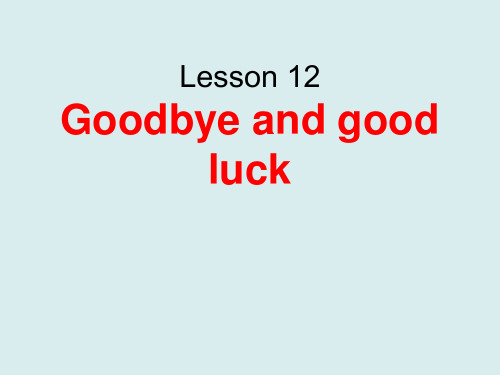
10.We are very proud of him. 我们为他而自豪。
★harbour n. 港口 port n. 港口 air port 航空港 Port指港、港口,水上具有可供船只装卸货物的设施的地方。多指人 工港口 harbour指港、海港、港口一块有足够深度为船只提供安全停泊口岸 的水域。多指天然港口
★proud adj. 自豪,自满 be proud of 以……为自豪,为(某人)感到自豪 Parents are proud of their children. pride n. 自豪 take pride in 以……为自豪
副总统下个星期回来。 3)be out出去:If someone phones, please tell them I shall be out the whole
day.如果有人打电话给我,请告诉他们我一整天都不在家。 4)be in在家:Yesterday afternoon I called on my uncle, but he was not in.
英语讲义

第1讲方法概述:短期记忆、长期记忆第2讲词汇记忆:一词多义、词性转化第3讲词汇记忆:词义引申第4讲词汇记忆:谐音法、拆分法第5讲词汇记忆:比对法(1)第6讲词汇记忆:比对法(2)第7讲词根记忆:音译谐音之spis, spect第8讲词根记忆:音译谐音之cid, cis第9讲词根记忆:音译谐音之tract,stract,string,strict 第10讲词根记忆:音译谐音之band,bond,bind第11讲词根记忆:音译谐音之log; fend第12讲词根记忆:根词借义之man,minis第13讲词根记忆:根词借义之cap,cup,cip第14讲词根记忆:摘取字母之spir第15讲词根记忆:摘取字母之vis,vid第16讲词根记忆:摘取字母之press;mov,mot,mob第17讲词根记忆:摘取字母之pos, pon第18讲词根记忆:摘取字母之clos,clud; voc,vok第19讲词根记忆:糅合造词之tain,ten第20讲词根记忆:词根比对之audi;dict第21讲词根记忆:词源故事之fess; rupt第22讲词根记忆:词源故事之graph,gram; scribe,script 第23讲词根记忆:词源故事之ceed,cede,cess第23讲词根记忆:词源故事之gress,grad第25讲超纲词第26讲词缀汇总第1讲方法概述一短期记忆1 音:Susan六句魔音元音发音不受阻,音节要以元音计;重在词末汉四声,其他位置汉一声;如无重音汉轻声,两点注意要记清eg.: superstition [ˌsu:pəˈstɪʃn]portray [pɔ:ˈtreɪ]hypocrisy [hɪˈpɒkrəsi]innumerable [ɪˈnju:m ər əbl]renaissance [r ɪˈne ɪsns]两点注意:(1) 只有一个音节的单词读作汉语四声(2) 两个单音节单词组合而成的复合词,部分读一声或四声,部分读轻声eg.:preach [pri:t ʃ]update [ˌʌp ˈde ɪt]football [ˈfʊtb ɔ:l]练习:sack [sæk]safeguard [ˈseɪfg ɑ:d]wholesome [ˈhəʊls əm]2形3义二 长期记忆六轮记忆法:1:Day 1 晚上复习当天记忆的词汇2:Day 2 早晨3:Day 6 早晨或晚上4:Day 16 早晨或晚上5:Day 46 早晨或晚上6:Day 106 早晨或晚上注意:(1)(2)(3)第2讲 词汇记忆:一词多义、词性转化 一 一词多义1 beareg.: ○1bear and forbear○2The tree bears well.○3bear the weight of the roof2 pupil3 springeg.: Then beverage companies started bottling the production of far-off springs, and now office workers unthinkingly sip bottled water all day long.4 sow5 novel6 soundeg.: ○1A sound mind is in a sound body.○2They have got home safe and sound.○3His argument is basically sound.○4There are possible risks, but nonetheless, we feel it's a sound investment.○5With heavy rain falling all night, she had a sound sleep.7 tear8 minute9 bound10 concreteeg.:Many Americans regard the jury system as a concrete expression of crucial democratic values…11 skyeg.: If the sky, and the share price, is falling, outside directors should be able to give advice based on having weathered their own crises.12 weathereg.: If the sky, and the share price, is falling, outside directors should be able to give advice based on having weathered their own crises.13 countereg.: ○1These habits have helped companies earn billions of dollars when customers eat snacks or wipe counters almost without thinking, often in response to a carefully designed set of daily cues.○2I do n’t like quotas either; they run counter to my belief in meritocracy, governance by the capable.○3Compared with their American counterparts, Japanese newspapers are much more stable…14 doctoreg.: …that is, the participants who thought the most positively doctored picture were real…15 communityeg.: Jurors should be selected randomly from a representative cross section of the community.二词性转化1 名词转为动词(1)foolorphancashpile(2)shipmailtelegram(3)bottlegaragecagelist(4)financeshelterfuelman(5)peeljuicedustskin(6)handshoulder2形容词转为动词(1)barefreehumble(2)warmdrynarrow(3)braverough3动词转为名词(1)translatorcoachcook(2)rejectimportcatch(3)curecover(4)dumpretreatdivide第3讲词汇记忆:词义引申 一 形状引申winghaircranecup二 比喻引申Edenapplebabeduck三 功能引申blanketscreeneg.: If we know female job screeners are more likely to reject attractive female applicants, we can help screeners understand their biases—or hire outside screeners.nursecapeg.: The Fuji mountain was capped with snow.四 抽象引申eyeeg.: He has an eye for the beautiful scenery.nerveeg.: How did he have the nerve to say that?mothereg.: Caution is mother of security.五 具体引申casejudgeaccountdeficiency第4讲词汇记忆:谐音法、拆分法一 谐音法1外来词sofa n.cool a.bar n.golf n.ballet n.card n.romance n.logic n.typhoon n. microphone n. hamburger n. salad n.brandy n.whisky / whiskey n. engine n.copy v.cartoon n.laser n.2 汉英对照bowl n.carve v.cut v.cheat v.dawn n.debt n.deliver v.delivery n.dip v.drag v.fatigue n.float v.govern n.government n. governor n. harmony n. horn n.howl v.ink v. /n. mould / mold n. mode n. luggage n.lug v.lure v.kin n.pan n.panel n. pave v.peel v. random a. route n.rude a. saint a. similar a. search v.shark n.sour a.sow v.sting v.temple n.tremble v.tie n.tomb n.tower n.tow v3 普通词汇 ambition n.awkward a.damn v.diamond n.drastic a.drug n.famine n.fertile a.glamor n.grant v.lame a.loyal a.naughty a.spoil v.stretch v.toss v.pest n.二 拆分法together adv.heroin n.heroine n.innocent a.incentive n.cargo n.inform v.copyright n.第5讲词汇记忆:比对法(1) 1 food —feed2 bread —breed3 bottle —butler4 sit —site —settle —setteesettle witheg.:○1You may settle with your friend.○2It’s time for me to settle with you.settle ineg.: The ABC hopes to settle in China.5 metal —medal6 ball —bail —pail7 arm —harm8 arduous —hard9 board —overboard —aboard —border—broad —abroad10 idea—ideal—idol—idle—idyleg.: ○1driven by the flow of work, money and ideas○2democratic ideals11 boom —doom —loom —gloom —groom —broom —deem —self-esteemeg.: ○1boom and bust○2chronicle one’s own doom○3be doomed to12 care v.core n.cure v.corn n.scorn v.scornful a.cereal n.cord n.cordless a.chord n.cordial a.courage n.discourage v.encourage v.decorate v.accord v.discord v.第6讲词汇记忆:比对法(2) 1 argument —augmentaugmentationauctionauctioneer2 derive —depriveeg.:○1derive pleasure from helping others○2deprive sb. of his political rights for life3 judge v./n.eg.:○1Don’t judge a book by its cover.○2Let me be the judge of that.○3It’not for you to judge.judgement /judgment n.judicial a.prejudice n.jury n.juror n.just n.justice n.justify v.4 acquire—inquire—requireeg.:○1Higher pleasures do require cultivation and appreciation and education. ○2“Why are you here again?" she inquired.5 sequence—subsequent—consequence6 personal—personalized—impersonal—interpersonal —personalityeg.:○1I need your advice on a personal matter, but it's not about me.○2An economic disaster was as impersonal as an earthquake.○3He is one of the best-known personalities in the world of tennis.7 pull—compel—pulse—impulse—expel—repel—rebel—propel——appealeg.:○1Susan is a fast thinker, and she acts on impulse.○2The headmaster decided to make an example of the pupil and expel him from the school. ○3The expelled man repelled billions of rebellions.○4He's a person propelled by ambition.第7讲词根记忆:音译谐音之spis, spect1spectexpect v.unexpected a.expectation n.expectancy n.eg.:○1Expectation is better than realization.○2She waited for her lover in a state of happy expectancy.○3life expectancyinspect v.eg.:It was strange that nobody inspected my ticket before I got on the train.inspector n.eg.:○1quality inspector○2Our building inspector has warned me that the ceiling might collapse if I put more books in the attic.inspection n.eg.:○1Inspection is cordially invited.○2Our exports have to pass a rigid inspection before they are shipped.respect v.eg.: My argument is different from yours in one crucial respect.with respect toeg.: It's going to raise a lot of problems with respect to environmental pollution.respectful a.respectable a.respective a.eg.: The laws apply to everyone irrespective of race, color, or creed.aspect n.eg.:○1You should consider all aspects of your decision, negative as well as positive.○2China's industry is assuming a new aspect.prospect n.eg.:○1The prospect from the balcony was breathtaking.○2John is in high spirits at the prospects.○3They went there to prospect for gold .prospective a.eg.:○1She is his prospective mother-in-law.○2prospective results in the experimentretrospect v.retrospection n.eg.: Master Zeng said,“Self-introspection should be practiced on a daily basis.”retrospective n.in retrospecteg.:○1In retrospect, it's easy to see why we were wrong.○2Raising a child can bring happiness in retrospect.suspect v.eg.:○1a romantic thriller about a cop who falls in love with a prime suspect in a murder case ○2I suspect that he has stolen my watch.○3I doubt that he has stolen my watch.suspected a.suspection n.perspective n.eg.: from a historical perspectivefrom my perspectivefrom the middle-class family perspectivespectate v.eg.: I cannot believe that anyone should want to spectate the ordinariness of my existence, for I certainly have no wish to spectate anyone else's.spectator n.speculate v.eg.:○1She often speculated as to what sort of man she would marry.○2It's dangerous to speculate.speculator n.speculation n.speculative a.spectacle n.eg.:○1She was a spectacle, sure enough.○2The children took in the spectacle open-mouthed.specular a.eg.: We watched a spectacular sunset at the beach.specularly adv.spectrum n.2 spicsuspicious a.be suspicious of =suspecteg.:○1Some women secretly inspect their husbands’cell phones, looking for suspicious messages when they suspect their husbands have extra-marital affairs.conspicuous a.eg.: Notices shall be put in conspicuous places.3 spisdespise v.eg.: People always pretend to despise those they don’t have.第8讲词根记忆:音译谐音之cid, cis1 ciddecide v.decision n.decisive a.accident n.incident n.eg.:One particular incident sticks in my mind.incidence n.incidental a.incidentally adv.eg.:The information was only discovered incidentally. coincide v.eg.:It’s a pity that our trips to New York don’t coincide. coincident a.coincidence n.occident n.suicide n.homicide n.feticide n.patricide n.matricide v.pesticide/insecticide n.herbicide n.2 cisscissors n.precise a.precisely adv.precision n.concise a.concision n.incise v.incisive a.assassinate v. assassination n. excise v. excision n.。
新概念英语第二册第12课课文详解及语法解析

【导语】学习英语并不难啊。
你还在为英语成绩低拖后腿⽽烦恼吗?不要着急,⽆忧考⼩编为⼤家提供了新概念英语第⼆册第12课课⽂详解及语法解析。
相信加⼊学习当中的你,很快便不再受英语的困扰!还在等什么?和⼩编⼀起来学习吧! 课⽂详注 Further notes on the text 1.Our neighbour, Captain Charles Alison, will sail from Portsmouth tomorrow. 我们的邻居查尔斯·艾利森船长明天就要从朴次茅斯启航了。
(1)这个句⼦以及本课的⼤部分句⼦⽤的是⼀般将来时(cf. 本课语法) (2)句⼦的主语部分our neighbour 和Captain Charles Alison为同位语。
(cf. 第4课语法)下⽂ He will be in his small boat,Topsail 中的Topsail 也为同位语。
2.We'll meet him at the harbour early in the morning. 明天⼀⼤早我们将在码头为他送⾏。
在表⽰时间的短语 in the morning, in the afternoon等前⾯可以再加上early, late等副词,以便更确切地表⽰时间: Tony will arrive late in the afternoon. 托尼下午晚些时候才能抵达。
3.Topsail is a famous little boat. “涛波赛”号是艘有名的⼩艇。
little除了表⽰形体上⼩的意义之外,还含有“可爱”的意思,是个带有感*彩的词。
如little Tom(⼩汤姆)就有⼀种亲昵的味道。
4.It has sailed across the Atlantic many times. 它已经多次横渡⼤西洋。
across 是对某个细长物“横切”、“横断”、“横渡”等,尤指河流、马路等等。
Unit12Wealllhaveourtroubles知识点(讲义)新概念英语青少版2A
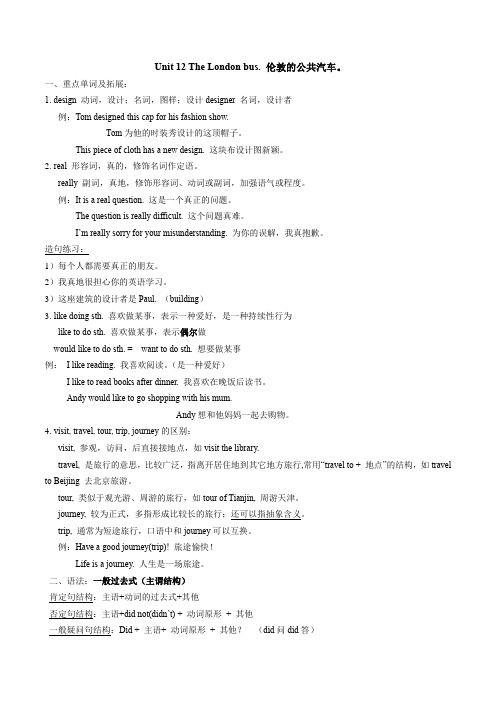
Unit 12 The London bus. 伦敦的公共汽车。
一、重点单词及拓展:1. design 动词,设计;名词,图样;设计designer 名词,设计者例:Tom designed this cap for his fashion show.Tom为他的时装秀设计的这顶帽子。
This piece of cloth has a new design. 这块布设计图新颖。
2.real 形容词,真的,修饰名词作定语。
really 副词,真地,修饰形容词、动词或副词,加强语气或程度。
例:It is a real question. 这是一个真正的问题。
The question is really difficult. 这个问题真难。
I’m really sorry for your misunderstanding. 为你的误解,我真抱歉。
造句练习:1)每个人都需要真正的朋友。
2)我真地很担心你的英语学习。
3)这座建筑的设计者是Paul. (building)3.like doing sth. 喜欢做某事,表示一种爱好,是一种持续性行为like to do sth. 喜欢做某事,表示偶尔做would like to do sth. = want to do sth. 想要做某事例:I like reading. 我喜欢阅读。
(是一种爱好)I like to read books after dinner. 我喜欢在晚饭后读书。
Andy would like to go shopping with his mum.Andy想和他妈妈一起去购物。
4.visit, travel, tour, trip, journey的区别:visit, 参观,访问,后直接接地点,如visit the library.travel, 是旅行的意思,比较广泛,指离开居住地到其它地方旅行,常用“travel to + 地点”的结构,如travel to Beijing 去北京旅游。
新概念英语二册第12课详细教案笔记

【New words and expressions】(6)★luck [lʌk] n. 运气, 幸运eg. Good luck! 祝你好运!Bless you! 祝福你!bad luck 噩运●lucky(adj.) 幸运的●unlucky(adj.) 不幸的eg. lucky day 幸运日I t’s my lucky day today. 今天我真幸运!lucky number 幸运数字lucky dog 幸运儿★captain [ˈkæptɪn] n. 船长,首领,机长eg. Captain James 詹姆斯船长Professor Wang 王教授Doctor Li 李博士/李医生Captain America 美国队长,美国上尉★sail [seɪl](1)n. 帆eg. This boat has white sails. 这条小船有白色的帆。
sailboat 帆船(2)v.(船)航行eg. The ship is sailing for New York. 这艘船正驶往纽约。
(3)v.(人)乘船航行eg. I want to sail around the world. 我想乘船周游世界。
★go shopping, go swimming, go skating, go boating, go sailing★harbour [ˈhɑːbə(r)](英) n. 港口—— harbor(美)eg. a fishing harbour 一个渔港a busy harbor 一个热闹的港口●port 港口eg. passport 护照airport 飞机场★proud [praʊd] adj. 自豪的(1)be proud of 以…为自豪,为(某人)感到自豪eg. Parents are proud of their children.父母亲为他们的孩子感到骄傲自豪。
(2)be proud to do sth. 自豪做某事eg. I am proud to enter for this petition.我自豪参加这场比赛。
二年级英语上册 Unit 2 Friends(Lesson12)教案 人教新起点

Play the games . and help the students to grasp the words .
A.The teacher reads the words .
B.Let the students show the pictures of the new words .
Lesson 12
教学目标:
1.情感目标:
a.通过开展丰富多彩的课堂活动,激发学习英语的兴使学生了解家庭成员之间的关系,帮助学生逐渐养成尊老爱幼的传统美德。
2.知识目标:
a.能在本课涉及到的情景条件下听懂并说出有关家庭成员的7个单词。
b.能在本课涉及的情景条件下使用本课所学的句型。
3.能力目标:
a.让学生通过观察教学挂图,并在理解的基础上跟读模仿录音,以巩固复习本单元描写同学朋友的单词和句子。
b.通过学生分角色表演故事大意,培养学生在语篇的学习中形成初步的阅读能力。
教学重点:让学生通过观察教学挂图,听录音,理解故事大意。
教学难点:培养学生在语篇的学习中形成初步的阅读能力。
教具准备:录音机,教学卡片,部分实物和模型水果。
Homework :
Copy the words .
Read the text .
Play the games .
Let the students perform the dialogues .
Two students a group to perform the dialogues .
Listen to the tape .And then make dialogues .
- 1、下载文档前请自行甄别文档内容的完整性,平台不提供额外的编辑、内容补充、找答案等附加服务。
- 2、"仅部分预览"的文档,不可在线预览部分如存在完整性等问题,可反馈申请退款(可完整预览的文档不适用该条件!)。
- 3、如文档侵犯您的权益,请联系客服反馈,我们会尽快为您处理(人工客服工作时间:9:00-18:30)。
1 二年级同步班
·Where Is It? 重点知识总结 亲爱的家长,您好!
在本课的学习中,老师带着孩子们预习了6
个重点词汇和相关练习,帮助孩子们解决词汇的认读问题,使开学后的学习更加轻松。
温故而知新,
请提醒孩子不仅要按时上课,认真听课,
还要在课后及时复习,这样才能达到事半功倍的效果。
加油! 现将本课重点知识总结如下:
Key Words 重点词汇
on
prep. 在…上面
in prep. 在…里面 under prep. 在…下面
behind
prep. 在…的后面
next to prep. 在…旁边 between prep. 在…中间
请您仔细阅读并保存好,帮助孩子进行梳理,并督促孩子认真完成讲义上的练习。
希望在主讲老师的带动和家长的配合下,孩子能够从行为习惯、学习兴趣及成绩上有质的变化!
学而思网校小学英语产品部 截图扫码,下载课程资料。
